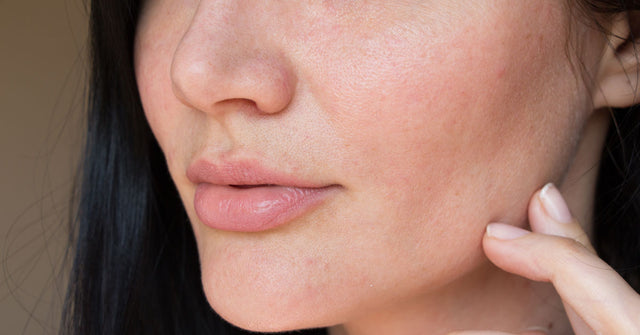Do you sometimes wake up with puffy eyes in the morning and wonder what is happening to you? You are not alone! In this article, you will discover the science behind puffy eyes, the reasons you might be having them, and how to get rid of the puffiness.
What Are Puffy Eyes, and Why Do They Occur?
Puffy eyes are swellings caused by the pooling of fluid around the eye. It is also called periorbital puffiness or edema, a medical term used to describe fluid accumulation in the tissues.
Puffy eyes in the morning occur due to normal body changes, genetics, certain medical conditions, lifestyle choices, etc. While some of these causes are non-modifiable, you can avoid or treat many of them. This article presents the common reasons and factors that may cause eye puffiness.
What are The Different Types of Eye Puffiness?
There are three types of eye puffiness — temporary, chronic, and seasonal.[1] The causes of puffy eyes in the morning fall into any of these categories.
- Temporary eye puffiness: This is eye puffiness that lasts for less than 24 hours. It may disappear without the use of any medication. For example, eye puffiness due to lack of sleep and crying are temporary.
- Chronic eye puffiness: This eye puffiness lasts longer than 24 hours and may require a remedy for relief. Eye puffiness caused by aging and allergies are usually chronic.
- Seasonal eye puffiness: This eye puffiness is associated with a season or period that exposes you to triggers of eye puffiness in the environment. The triggers include allergens or irritants.
Note that knowing the different types of eye puffiness will guide you on how to get rid of puffy eyes instantly. It will help you decide whether or not your eye puffiness warrants a visit to your physician.
10 Reasons You Have Puffy Eyes In The Morning
1. Sleeping
Puffy eyes in the morning can be a normal response because you are not blinking to allow better fluid circulation, leading to its retention. This sort of eye puffiness usually lasts a few minutes to hours after waking up and resolves without therapy.[2]
2. Crying
You can get puffy eyes from crying, especially when it is excessive. This is because doing so produces more tears than the lacrimal drainage can handle at a time. The tissues surrounding the eyes may absorb the tears, causing puffiness.
3. Aging
Aging comes with many body changes. So, the muscles and tissues around the eyes become weak and flabby. Fine lines and wrinkles also appear. These changes make the skin around the eye saggy and appear puffy. However, you can reduce puffiness with Eyevage and other anti-aging creams.
4. Insufficient water intake
Hydration has a positive effect on the general appearance of the skin. It makes the skin look supple and moisturized. But when dehydrated, the eyes sink, and the surrounding skin looks dry and saggy, giving them a puffy appearance.
5. High salt intake
Consuming foods with high salt content can lead to eye puffiness. For instance, processed and canned foods contain high quantities of salt and may cause you to consume more than the daily salt requirement of less than 2,300 mg or a tablespoon. High salt intake causes fluid retention in the tissues around the eyes, which leads to eye puffiness.[3]
6. Allergies
Eye puffiness can be a result of an allergic reaction. Allergens such as pollen and foods like peanuts and eggs can cause inflammatory responses like swelling and redness around the eyes due to the release of histamine.[4]
7. Lack of sleep
Sleep plays an important role in keeping both our mental and physical health intact. Research shows that sleep deprivation can manifest physically with eye puffiness.[5] This is because tiredness can expand the blood vessels, leading to fluid accumulation.
8. Excessive alcohol consumption
A hangover face, characterized by swollen or puffy eyes, is what you get with excessive alcohol consumption. Alcohol in high amounts may cause signs of inflammation, like swellings and redness in the eye. Alcohol may also cause dehydration, which can lead to eye puffiness, as earlier described.
9. Smoking
Smoking releases many chemicals that break down collagen and elastin, which makes the skin firmer and reduces wrinkles. With the loss of skin firmness and wrinkling, eye puffiness can occur.
10. Menstrual periods
Hormonal imbalance during menstrual periods can cause swollen eyes in the morning.
Eye Bags Vs. Puffy Eyes
Is there a difference between eye bags and puffy eyes? Although the common denominator of the two is swelling, there is a difference.
Eye bags are swellings occurring in the lower eyelids that usually come with aging because of muscle or tissue weakness. These swellings may come from the accumulation of fat or fluid in the lower eyelids. They could also be due to lack of sleep, allergies, smoking, or a medical condition.[6]
Meanwhile, in puffy eyes, the swelling is not restricted to the lower eyelid but surrounds the eye. Hence, another name for puffy eyes is periorbital puffiness (peri means around, and orbital refers to eyeball).
Puffy Eyes May Indicate a Health Issue
Although puffy eyes in the morning are largely a cosmetic concern, in some cases, they may indicate the presence of an underlying medical condition. If your eye puffiness persists for more than 24 to 48 hours and defies any home remedy or precautionary measure, you should visit your physician as it may indicate a health issue.
Moreover, you should also seek your physician's advice if your eye puffiness is associated with symptoms such as eye pain, low vision, light sensitivity, blurry vision, seeing floaters, and the sensation of a foreign body in your eye.
Medical conditions that can cause puffy eyes include Graves’ disease, orbital cellulitis, dermatomyositis, angioedema, and eye cancer.
How to Get Rid of Puffy Eyes
1. Use eye mask + patches
Eye masks and patches contain bases that help hydrate and moisturize the skin surrounding the eyes. Use an eye mask and patches in the morning for the best outcome.
2. Use eye cream
Eye creams also contain ingredients with anti-inflammatory, hydrating, and moisturizing properties.
3. Use cold compresses
You can resolve puffy eyes in the morning via simple home remedies like a cold compress. An ice pack or a cold cucumber can help relieve puffy eyes by constricting the blood vessels.[7]
4. Use tea bags
You can use tea bags as cold or warm compresses to relieve puffy eyes. In addition, research shows that tea contains anti-aging, anti-inflammatory, and antioxidant properties, which combat puffy eyes.[8]
5. Use Retinol
Retinol helps to increase the production of collagen and fibroblasts to keep the skin firmer.[9] It reduces wrinkles and fine lines. You can use retinol-based creams like Suvoderm Retinol Night Cream to get rid of puffy eyes.
6. Use a deep hydrating moisturizer
Deep hydrating moisturizers prevent skin dryness, slow aging, and other skin disruptions. A good choice for a moisturizer is Infusoderm Deep Hydrating Moisturizer.
7. Massage the skin around the eyes
Massaging the skin around the eyes helps blood flow and oxygenation of the tissues. This prevents puffiness and keeps the skin healthy.
8. Eat potassium-rich foods
Potassium aids in decreasing excess fluid in the body. Consuming bananas, yogurt, nuts, and leafy greens will increase your potassium levels and reduce fluid retention and eye puffiness.
Frequently Asked Questions
What foods cause puffy eyes?
Dairy, tomatoes, canned foods, shellfish, peanuts, eggs, and wheat bread can cause puffy eyes in the morning.
How do you visibly reduce puffy eyes?
Lifestyle changes with adequate sleep and low salt intake, home remedies such as cold compress, and eye creams can help depuff your eyes.
Can puffy eyes go back to normal?
Puffy eyes can heal with the right remedies, except when genetics or some medical conditions are involved.
When should I be worried about puffy eyes?
You should be worried about your puffy eyes if they last beyond 24 to 48 hours, defy remedies, or are associated with other eye problems.
Conclusion
Eye puffiness is swelling around the eyes caused by factors such as lack of sleep, certain foods, lifestyle choices, and some medical conditions. Having puffy eyes in the morning is usually nothing to worry about and can be taken care of using simple home remedies.
Nevertheless, this piece has shown you how to depuff eyes with measures such as cold compresses, consuming the right foods, and using eye patches, eye creams, and moisturizers.
More importantly, the puffiness might indicate the presence of an underlying medical condition. If the puffiness persists, you should seek the advice of your physician.
References
1] ↑ Understand the Causes of Puffy Eyes and Find Relief- Nikon. Nikon Lenswear India. Published February 8, 2023. Accessed October 2, 2023.
2] ↑ Prevent Puffy Eyes With These Expert Tips. Consumer Reports. Published June 17, 2022. Accessed October 2, 2023.
3] ↑ Nutrition C for FS and A. Sodium in Your Diet. FDA. Published online October 12, 2021.
4] ↑ Why Do I Get Swollen Eyes In The Morning? Causes & Treatments. blog.themomsco.com. Published February 12, 2021. Accessed October 2, 2023.
5] ↑ Sundelin T, Lekander M, Kecklund G, Van Someren EJW, Olsson A, Axelsson J. Cues of Fatigue: Effects of Sleep Deprivation on Facial Appearance. Sleep. 2013;36(9):1355-1360. doi:
6] ↑ Bags under eyes - Symptoms and causes. Mayo Clinic. Published 2018.
7] ↑ Nast C. The expert’s guide to getting rid of puffy eyes in the morning. Vogue India. Published May 26, 2021. Accessed October 2, 2023.
8] ↑ Khan N, Mukhtar H. Tea and health: studies in humans. Current pharmaceutical design. 2013;19(34):6141-6147. doi:
9] ↑ Zasada M, Budzisz E. Retinoids: active molecules influencing skin structure formation in cosmetic and dermatological treatments. Advances in Dermatology and Allergology. 2019;36(4):392-397. doi:
Mentioned in this article
More stories

Skin Brightening - Top Skincare Tips To Help Brighten Your Skin






